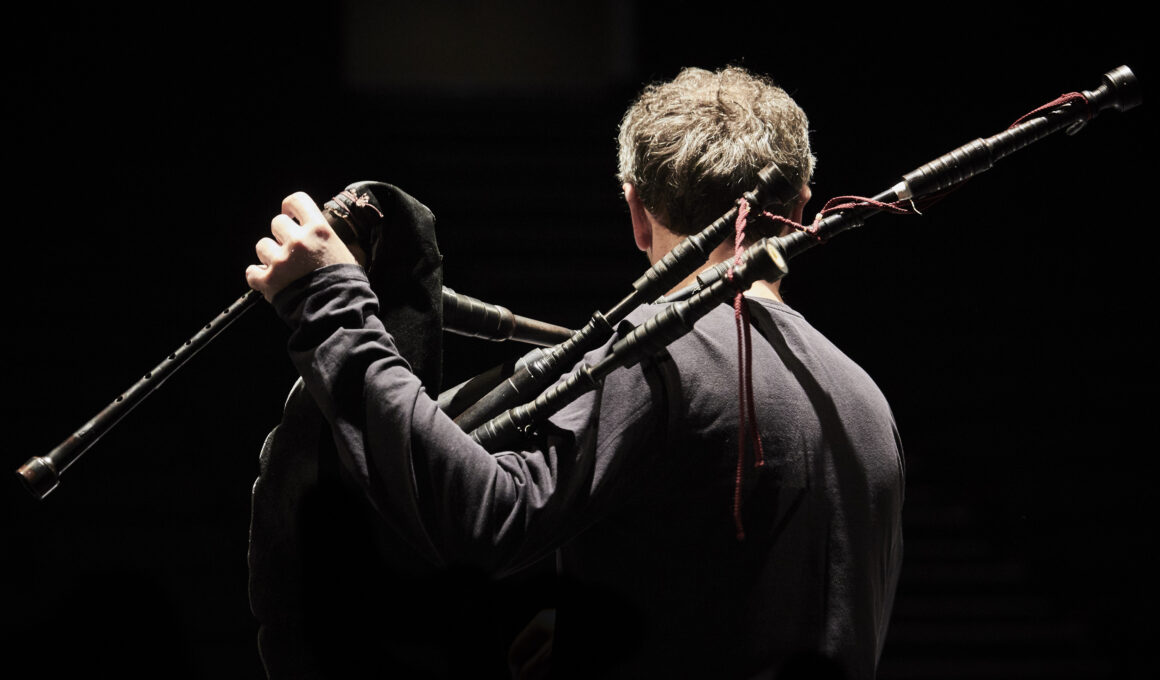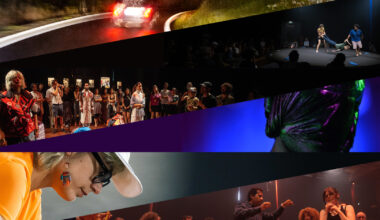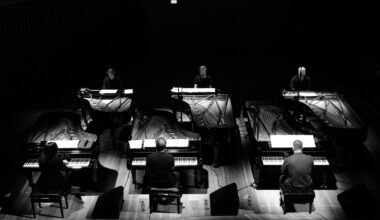Some instruments are labelled “traditional” without a second thought, as if they had no potential for innovation. For more than ten years, Erwan Keravec has been exploring new possibilities of expression with the bagpipes in close collaboration with various composers.
Also active in the fields of improvisation and jazz, the musician has opened up new perspectives on the instrument with projects such as “Urban Pipes” and the SONNEURS group. At MaerzMusik 2024, he will perform three works of contemporary music, two of which were written especially for him and his instrument. Heiner Goebbels’ “N°20/58” is a piece that plays with the positioning of the musician in relation to his audience as well as with musicological quotations – more precisely, references to Johann Sebastian Bach.
As part of her ongoing series exploring the untapped sonic potential of acoustic instruments, Éliane Radigue composed “OCCAM XXVII” for Keravec, a piece that brings him in close proximity to the audience. It is an unusual work that brings forth unexpected tonalities from the instrument. “Two Pages” by Philip Glass stands out in the programme as the only work not composed for the bagpipes. Keravec’s adaptation of the piece originally written for piano and organ proves how elegantly the principles of minimalism can be transferred to the bagpipes – building a bridge between different traditions whose history is still being written.
FACTS
1. As Nathan Coley wrote everywhere: There will be no miracles here.
2. As Eliane Radigue said: the simplest is always the best.
3. As Mats Gustafsson said: A piece of vinyl per day keeps the doctor away.
1. What is the biggest inspiration for your music?
The sound, when it gives you chills.
I’m not able to explain why but the sound of a bagpipe sometimes give me chills.
2. How and when did you get into making music?
I started playing music really young, around 8.
My first relation with music was cultural. My family was involved in associations for breton culture, roots music and roots dance.
I learnt to play with other musicians, not music teachers. There was no class at the conservatory at this time.
Around 20 years old, I started to play new music for bagpipe. This music is far from the breton traditional music
So… it was not easy at the beginning; a lot of questions around me.
3. What are 5 of your favourite albums of all time?
– Djelimoussa Cissoko Kora Solo
– « Enter » by Fire! Orchestra
– « Continuum » by Ligeti
– « 280 mesures pour Clarinette » by Georges Aperghis
– « En route pour la joie » of Noir Désir
4. What do you associate with Berlin?
I’m not one hundred per cent sure, but I think my first concert abroad was in Berlin.
It was with Beñat Achiary, a singer from Basque Country, for a Jazz Festival.
It was a challenge for me to play there. First, because Beñat and me are from traditional music and we both improvise.
And, because it was a Jazz Festival, I was scared the audience would be more used to saxophone than bagpipe.
Not at all, they were noiseless, available, attentive and curious.
5. What’s your favourite place in your town?
I live in Lorient, in the south of Bretagne in France.
There is a special place there. During the WW2, Nazi built a Submarine Base.
Just before the end of the war, British Army tried to destroy it. They failed, the structure is still there.
But the town was 90% destroyed.
Nowadays, several sailing race teams are based there. And close, there is the Trade Harbor and the departure to the Island of Groix.
When you stroll there, you can see Ultim Sailboats (the faster sailboats in the world), Tankers, Ferrys and Kite surf in the same roadstead…
6. If there was no music in the world, what would you do instead?
I would have time…
If there was no music, I wouldn’t miss it and I would be happy with something else… I hope
But, as Nietzsche wrote : « How little is needed for happiness! The sound of a bagpipe. Without music life would be a mistake. »
7. What was the last record/music you bought or listen?
It was a vinyl of Mahmoud Ahmed. I really enjoy the Ethiopic Collection of Buda Music.
They work on reedition of recording of Ethiopian jazz of the seventies.
But this one is on another label but still the same idea.
8. Who would you most like to collaborate with?
As musician, Tanya Tagaq, for sure. She is a singer who practices the goat vocal technic of Inuits in Canada.
I’m sure my bagpipe with her voice would be fantastic maelstrom of sound.
As performer, Anne Teresa de Keersmaeker. She worked a lot with music especially with Ictus ensemble but not only.
She used different kind of music. I hope, one day, she will be interested in mine…
9. What was your best gig (as performer or spectator)?
IN C // 20 PIPERS at the SUBS in Lyon.
It was the third time we played this piece. We first-performed it 2 days before in Paris.
We play in circle, the audience in the middle. People can do what they want: stay standing, sitting, inside of the circle or outside.
This day in Lyon was really special. A lot of people stayed in the circle, using the back of a friend to stay standing, eyes closed. You could feel the emotions running through the audience
10. How important is technology to your creative process?
This is not really important in my work. Sometimes, I collaborate with sound designers. I’m really curious of what they can do. But, it’s not my subject.
11. Do you have siblings and how do they feel about your music?
I have 2 sisters and a brother.
My bother is a bombard player and he plays with me in several projects.
One of my sisters is also musician, and the last one was a bombard player too.
Sometimes, they really enjoy what I play. Sometimes, they want to discuss but they are always curious


